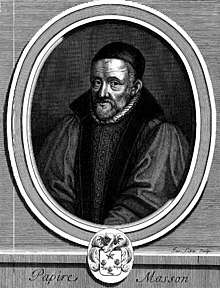Jean Papire Masson
Jean Papire Masson Latin: Papirius[1] (1544, in Saint-Germain-Laval, Loire – 1611) was a French humanist historian, known also as a geographer, biographer, literary critic and jurist.

Life
Masson was initially a Jesuit, but left the Society.[2] He studied law at Angers under François Baudouin around 1570.[3] He became close to the circle of Catherine de' Medici, particularly to Carlo Boni, and became professor of law at Angers, where Boni was bishop.[4] Later he was librarian to the Chevalier de Chiverny, was avocat to the Parlement of Paris, and married.[2]
Works
He defended Antoine Matharel against François Hotman.[5] He may in fact have written much of Matharel's Responsio (1575) to Hotman's monarchomach work Francogallia.[6][7] The debate became a pamphlet war and slanging match.[8]
The Latin life of John Calvin attributed to Masson had a reputation in its time as fair-minded.[9]
Masson discovered a manuscript of Agobard in 1604, and edited it.[10]
References
- Also Jean Papyre Masson
- Jean Antoine Rigoley de Juvigny; François Grudé de La Croix Du Maine; Antoine Du Verdier; Bernard de La Monnoye (1772). Bibliothèque Françoise De La Croix Du Maine. 2. Paris: Saillant & Nyon / Lambert. p. 217.
- Randall C. Zachman (1 September 2008). John Calvin and Roman Catholicism: Critique and Engagement, Then and Now. Baker Academic. pp. 34–5. ISBN 978-0-8010-3597-5. Retrieved 28 July 2012.
- Henry Heller (2003). Anti-Italianism in Sixteenth-Century France. University of Toronto Press. p. 118. ISBN 978-0-8020-3689-6. Retrieved 28 July 2012.
- Quentin Skinner (30 November 1978). The Foundations of Modern Political Thought: The Age of Reformation. 2. Cambridge University Press. p. 318. ISBN 978-0-521-29435-5. Retrieved 28 July 2012.
- François Hotman; Ralph E. Giesey; J. H. M. Salmon (10 June 2010). Francogallia. Cambridge University Press. p. 77. ISBN 978-0-521-15318-8. Retrieved 28 July 2012.
- Denis Pallier (1975). Recherches sur l'imprimerie à Paris pendant la Ligue, 1585-1594 (in French). Librairie Droz. p. 46 note 29. ISBN 978-2-600-03432-6. Retrieved 28 July 2012.
- Paul-Alexis Mellet (2007). Les Traités Monarchomaques: Confusion des Temps, Résistance Armée et Monarchie Parfaite, 1560-1600 (in French). Librairie Droz. pp. 340–1. ISBN 978-2-600-01139-6. Retrieved 28 July 2012.
- Irena Dorota Backus (2008). Life Writing in Reformation Europe: Lives of Reformers by Friends, Disciples and Foes. Ashgate Publishing, Ltd. p. 220. ISBN 978-0-7546-6055-2. Retrieved 28 July 2012.
- Courtney M. Booker (12 August 2009). Past Convictions: The Penance of Louis the Pious and the Decline of the Carolingians. University of Pennsylvania Press. p. 321. ISBN 978-0-8122-4168-6. Retrieved 28 July 2012.